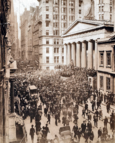The Business and Economics Portal Business is the practice of making one's living or making money by producing or buying and selling products (such as goods and services). It is also "any activity or enterprise entered into for profit." A business entity is not necessarily separate from the owner and the creditors can hold the owner liable for debts the business has acquired. The taxation system for businesses is different from that of the corporates. A business structure does not allow for corporate tax rates. The proprietor is personally taxed on all income from the business. A distinction is made in law and public offices between the term business and a company such as a corporation or cooperative. Colloquially, the terms are used interchangeably. (Full article...) Economics (/ˌɛkəˈnɒmɪks, ˌiːkə-/) is a social science that studies the production, distribution, and consumption of goods and services. Economics focuses on the behaviour and interactions of economic agents and how economies work. Microeconomics analyses what is viewed as basic elements within economies, including individual agents and markets, their interactions, and the outcomes of interactions. Individual agents may include, for example, households, firms, buyers, and sellers. Macroeconomics analyses economies as systems where production, distribution, consumption, savings, and investment expenditure interact, and factors affecting it: factors of production, such as labour, capital, land, and enterprise, inflation, economic growth, and public policies that have impact on these elements. It also seeks to analyse and describe the global economy. (Full article...) Selected articleThe Panic of 1907 was a financial crisis that occurred in the United States when its stock market fell close to 50 percent from its peak the previous year. Primary causes of the run included a retraction of market liquidity by a number of New York City banks, a loss of confidence among depositors, and the absence of a statutory lender of last resort. The crisis occurred after the failure of an attempt in October 1907 to corner the market on stock of the United Copper Company. When this bid failed, banks that had lent money to the cornering scheme suffered runs which later spread to affiliated banks and trusts, leading a week later to the downfall of the Knickerbocker Trust Company—New York City's third-largest trust. The collapse of the Knickerbocker spread fear throughout the city's trusts as regional banks withdrew reserves from New York City banks. The panic would have deepened if not for the intervention of financier J.P. Morgan, who pledged large sums of his own money, and convinced other New York bankers to do the same, to shore up the banking system. By November the contagion had largely ended. The following year, Senator Nelson W. Aldrich established and chaired a commission to investigate the crisis and propose future solutions, leading to the creation of the Federal Reserve System. Selected image
Selected economyThe economy of Belize is a small, essentially private enterprise economy that is based primarily on agriculture, tourism, and services. The cultivation of newly discovered oil in the town of Spanish Lookout has presented new prospects and problems for this developing nation. Belize's primary exports are citrus, sugar, and bananas. Belize's trade deficit has been growing, mostly as a result of low export prices for sugar and bananas. The new government faces important challenges to economic stability. Rapid action to improve tax collection has been promised, but a lack of progress in reining in spending could bring the exchange rate under pressure. The Belize dollar is fixed to the U.S. dollar at a rate of 2:1. (Full article...) Selected quoteIt is the business of the production engineer to know every single item that constitutes his finished product, and every step involved in the handling of every piece. He must know what is the most advantageous manufacturing quantity of every single item so as to secure uniformity of flow as well as economy of manufacture. He must know how long each step ought to take under the best attainable working conditions. He must be able to tell at any time the exact condition as regards quantity and state of finishedness of every part involved in his manufacturing process. The engineer must be able not only to design, but to execute. A draftsman may be able to design, but unless he is able to execute his designs to successful operation he cannot be classed as an engineer. The production engineer must be able to execute his work as he has planned it. This requires two qualifications in addition to technical engineering ability: He must know men, and he must have creative ability in applying good statistical, accounting, and " system" methods to any particular production work he may undertake. With regard to men, he must know how to stimulate ambition, how to exercise discipline with firmness, and at the same time with sufficient kindness to insure the good-will and cooperation of all. The more thoroughly he is versed in questions of economics and sociology, the better prepared will he be to meet the problems that will daily confront him. As economic production depends not only on equipment and plant, but on the psychological effect of wage systems, he must be able to discriminate in regard to which wage system is best applicable to certain classes of product.
TopicsRelated WikiProjectsDid you know (auto-generated) -
On this day in business history
General imagesThe following are images from various business-related articles on Wikipedia.
More did you know
Business news Wikinews Economy and business portal
|
How Can We Help?











































Recent Comments